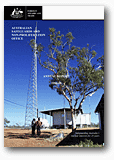


Annual Report 1998-99 |
 |
THE PROPOSED FISSILE MATERIAL CUT-OFF TREATY
Australia sees the negotiation of an FMCT as a high priority. FMCT would prohibit the production of any further fissile material for nuclear weapons. It would bring all fissile material production facilities that today are not subject to any international verification, and all newly produced fissile material, under an effective international verification and monitoring regime to ensure that further production of fissile material was for exclusively peaceful use, or non-proscribed military use (e.g. naval propulsion).
Since non-nuclear weapon States party to the NPT have already foresworn the option to produce fissile material for nuclear weapons - a commitment verified by the comprehensive safeguards applied by the IAEA - the FMCT will have little impact on their current activities. The impact of the FMCT will be on the five recognised nuclear-weapon States - the United States, Russia, the United Kingdom, France and China - and the so-called ‘threshold’ or ‘nuclear-capable’ States - India, Israel and Pakistan. The FMCT will provide assurance that the stocks of fissile material held outside international verification will not increase.
During the last four years ASNO, in close collaboration with DFAT, has been active in the development and promotion of practical concepts for the verification of States’ obligations under an FMCT. Specifically, ASNO has developed a ‘focused’ approach to FMCT verification. ASNO’s activities have included publications, presentation of conference papers, participation in international seminars, and discussions with counterparts in other countries and the IAEA. At the IAEA’s request, an ASNO officer has been made available to assist the development of verification approaches for the FMCT.
In ASNO’s view, the focused approach, covering only the most proliferation-sensitive facilities and materials, is both appropriate and technically adequate for the FMCT. Under a focused approach, international verification would be applied to:
- all unirradiated plutonium, highly enriched uranium and uranium-233 produced after entry into force (‘subject material’), in both peaceful and non-proscribed military activities and downstream facilities used for storing, processing, utilisation, or disposal of subject material; and
- all production facilities, that is, facilities with enrichment and reprocessing capabilities that are, have been, or could be capable of producing unirradiated subject material;
- in addition, the FMCT verification regime will include measures aimed at detection of possible undeclared production facilities.
Immediate commencement of negotiations on a FMCT is a major priority for Australia. The challenge is how to negotiate a treaty that will achieve results favourable for all participants, given that interests and priorities vary so much. In ASNO’s view the focused approach is the appropriate basis for the development of verification arrangements which will be both effective and cost-efficient.